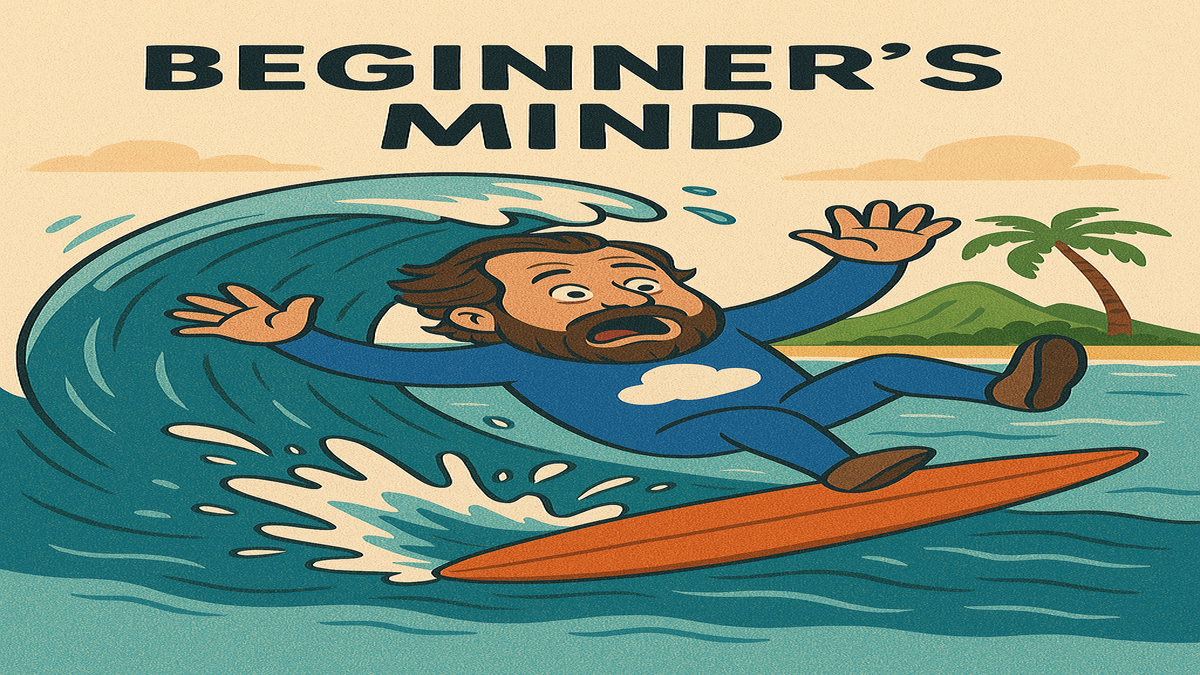Beginner’s Mind in a World of Experts: Lessons from Marc Benioff (and My Five-Year-Old)
When you’ve been in the game long enough—whether in tech, business, or life—you earn the right to call yourself experienced. But what if the real power lies not in what you already know, but in how willing you are to see the world as if you don’t?
Marc Benioff, the founder of Salesforce, calls this beginner’s mind—a concept he borrowed from Zen Buddhism that’s become a guiding principle in how he leads, innovates, and builds culture.
Translation: I am trying to cultivate a beginner’s mind, but it is difficult.
What is Beginner’s Mind?
Coined in the West by Shunryu Suzuki in Zen Mind, Beginner’s Mind, the idea is simple but powerful:
“In the beginner’s mind there are many possibilities, in the expert’s mind there are few.”
It’s about showing up with curiosity, humility, and openness—even when you’re at the top of your game. It’s not about discarding expertise, but about complementing it with a willingness to stay curious and open. Beginner’s mind is less about inexperience and more about intent: a conscious choice to resist complacency.
My Son, the Relentless Consultant
Every morning lately, my five-year-old son asks “why?”
And then, inevitably: “why?” again. And again. Until we’ve either unravelled the mysteries of the universe—or I’ve run out of coffee and patience.
It’s payback, really—I was exactly the same. But it struck me how relevant this relentless curiosity is to what I do every day. In consulting and sales, the 5 Whys technique helps uncover the root cause of a problem—peeling back assumptions until you get to the truth.
What my son does instinctively is actually a best practice in business discovery. His persistence is unfiltered beginner’s mind. Somewhere along the line, many of us are trained out of that. We reward answers more than questions. But the best consultants, sellers, and leaders I’ve worked with? They’re still asking why—just like a five-year-old.
Benioff’s Reset Button
Before launching Salesforce, Marc Benioff took a sabbatical in Hawaii to clear his head. He surfed, read deeply, and explored spirituality and self-inquiry. Out of that experience came clarity—not just about technology, but about values, purpose, and how work could be different.
This was beginner’s mind in action: stepping back from the noise of Silicon Valley to reimagine what a company could be. He didn’t come back with a product spec. He came back with a worldview—and that’s arguably what made Salesforce so enduring.
Benioff has spoken about keeping beginner’s mind even now, decades into his leadership journey. Whether it’s driving values-led innovation or embracing new frontiers like AI and automation, he stays curious. Not because he doesn’t know what he’s doing—but because he knows curiosity is what keeps him relevant.
Why This Matters More Than Ever
In a world obsessed with data, scale, and AI-powered answers, it’s easy to think the winners will be those with the best model or the most certifications.
But what if the edge isn’t knowing more—but questioning more?
Beginner’s mind is a superpower in the age of artificial intelligence. It lets us:
- Ask the right questions before rushing to answers
- Challenge assumptions that legacy systems (or legacies, full stop) are built on
- Embrace uncertainty and complexity
- Avoid mistaking output for impact
Beginner’s mind helps you pause just long enough to ask if we’re solving the real problem.
Try This: A Beginner’s Mind Checklist
- Are you listening more than you’re talking?
- Do you ask “why” more than once before proposing a solution?
- When was the last time you admitted you were wrong—or just didn’t know?
- Have you learned something this week from someone with less experience than you?
- Could your kid out-question you in a discovery meeting?
What About Balance?
To be clear—there’s nothing wrong with expertise. It’s what gives us confidence, capability, and the ability to move quickly. But the danger comes when expertise closes us off from possibility.
The goal is to hold both: the certainty of your experience and the openness of a beginner. That’s when things get interesting.
Final Thoughts
Beginner’s mind isn’t about being naive. It’s about being awake. Curious. Fully present. It’s about asking “why” not because you don’t know the answer, but because you want to understand the context better.
Whether you’re a CEO or a five-year-old—or somewhere in between—there’s power in that mindset.
In a world full of experts, be the one still asking questions.
Further Reading & Listening
- Book: Zen Mind, Beginner’s Mind – Shunryu Suzuki
- Podcast: Marc Benioff on “How I Built This”
- Essay: The Importance of Starting from Zero – James Clear
- Book: The Practice – Seth Godin
- Related Post: Harnessing Grit in the Sydney Hoka Runaway Half Marathon – pushing through the unknown, one step at a time, mirrors the same mindset needed when embracing beginner’s mind in new business territory.







